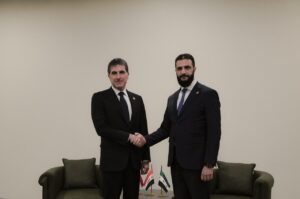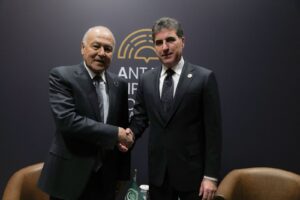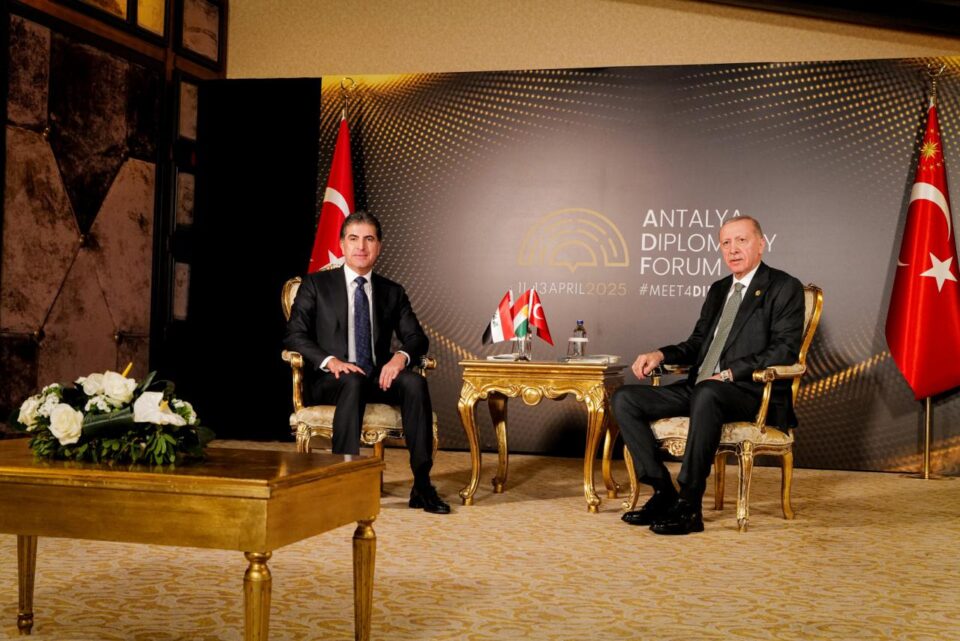In a significant diplomatic engagement, Kurdistan Region President Nechirvan Barzani participated in the annual Antalya Diplomacy Forum in Turkey this week, using the international platform to advance his vision for a new political framework in the Region. The forum, aptly themed “Reclaiming Diplomacy in a Fragmented World,” provided Barzani an opportunity to promote his long-championed principles of ethnic and religious coexistence.
During the three-day summit, Barzani held high-level meetings with several key regional figures, including Turkish President Recep Tayyip Erdogan, Syrian President Ahmed al-Sharaa, and Russian Foreign Minister Sergey Lavrov, underscoring the Kurdistan Region’s growing diplomatic importance in regional affairs.
Central to Barzani’s diplomatic engagements was his roadmap to peace, a strategic vision that addresses not only Kurdistan’s position within Iraq but also proposes solutions for broader regional stability. This roadmap emphasizes three critical dimensions: addressing Kurdish rights across the region, recognizing that Iraq’s stability has far-reaching implications beyond its borders, and acknowledging the challenges of implementing abstract ideals into practical policy.
The only rational remaining option for avoiding conflict is to grant autonomy to the Kurds within existing state borders, notes one analysis of Barzani’s position, highlighting the president’s pragmatic approach to Kurdish autonomy rather than pushing for independent statehood.
Barzani’s position on Iraq’s constitutional framework reveals his practical approach to governance. Rather than calling for a complete overhaul of Iraq’s 2005 constitution, he has consistently advocated for its full implementation. This stance reflects his belief that the existing document, if properly honored, provides sufficient protections for Kurdistan’s autonomy while maintaining Iraq’s territorial integrity.


Balancing Kurdish autonomy with territorial integrity: a pragmatic approach
A cornerstone of Barzani’s political vision is power-sharing among Iraq’s three major communities—Sunni Arabs, Shiite Arabs, and Kurds. This approach, sometimes referred to as consociational democracy, aims to ensure each group has guaranteed representation in Iraq’s government structures. While critics argue this reinforces sectarian divisions, Barzani’s supporters contend it recognizes the reality of Iraq’s social fabric and prevents domination by any single group.
The Kurdistan president’s advocacy for federalism extends beyond theory to addressing practical implementation challenges. His vision suggests that Kurdistan’s federal relationship with Baghdad could serve as a model for other regions in Iraq.
Notably, Barzani’s diplomatic messaging displays a strategic balance between idealism and realism. While emphasizing moral arguments for Kurdish autonomy based on historical suffering, he simultaneously frames support for the Kurdistan Region as aligning with Western powers’ self-interest—particularly regarding regional stability, energy security, and counterterrorism efforts.
The West should support the Kurds not because it is the right thing to do, but because it is in the self-interest of the West to do this, summarizes one assessment of Barzani’s approach, particularly as Europe seeks alternatives to other energy sources.
Building international support: strategic engagement at the Antalya Diplomacy Forum
Throughout his tenure, Nechirvan Barzani has positioned the Kurdistan Region as a stabilizing force in a turbulent region. His government’s policies have emphasized inclusive governance, religious tolerance, and economic development, making Kurdistan what many observers describe as a relative oasis of stability in an otherwise volatile Middle East.
The Antalya Forum appearance represents a continuation of Barzani’s efforts to elevate Kurdistan’s diplomatic profile while advocating for a new regional understanding that acknowledges Kurdish rights and autonomy as essential components of Middle Eastern stability.
As regional tensions persist and Iraq continues to face political challenges, Barzani’s roadmap to peace offers what he portrays as a pragmatic middle path—one that respects existing borders while acknowledging ethnic realities, balances central authority with regional autonomy, and recognizes that sustainable peace requires inclusive governance structures.
Whether this vision can gain broader acceptance in Baghdad and beyond remains to be seen, but Barzani’s persistent diplomacy and willingness to engage with diverse regional powers suggests he remains committed to pursuing this path despite the considerable obstacles that lie ahead.
By Jawad Qadir

